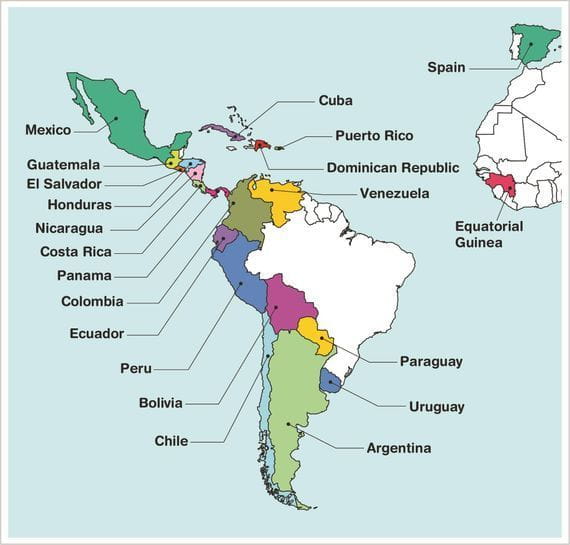What makes Spanish a valuable language compared to other popular options?
You may want to learn Spanish and improve your skills but need more motivation.
If you are already learning Spanish, you may be curious to know about the advantages. And the opportunities you will have once you speak fluently.
Perhaps you’re uncertain and still wondering whether Spanish is your ideal choice.
No matter your situation, you are at the right place. You will discover why immersing yourself in Spanish can transform your life.
Here, I have penned 23 convincing reasons to embark on the journey of Spanish studies. You can see how this decision can make a big difference in your life.
Table of Contents
I. Spanish is a widely spoken global language
Spanish is beneficial across the globe due to its across-the-board use. That is why it is helpful everywhere and for many purposes. Let’s examine it further!

I. Spanish is a widespread language
According to Cervantes, Spanish is spoken by over 591 million people globally with varying degrees of competency.
This means roughly 7.5% of the global population. This makes 493 million speakers in their mother tongue.
Around 100 million people speak it as a second or third language. We shouldn’t overlook advanced Spanish learners who don’t use the language daily.
Spanish is the second most spoken mother tongue and fourth most spoken language, after Mandarin, English, and Hindi. This is also the most widely used Romance language.
It’s hard to calculate the exact number of speakers. Still, given the vast global presence, it’s clear that Spanish is one of the most spoken languages.
Thus, it’s no surprise that Spanish is an international language with growing demand.
2. It is the official language of 20 nations
Are you aware of the number of countries with Spanish as their official language?
Spanish is not just spoken in a few nations, but an exact count of 20 countries where it serves as the de facto language.
The value of famous languages like German, Italian, Portuguese, and Japanese is limited to only a few nations.
Spanish is one of the few languages with a global presence. English, French, and Arabic are other languages that can be helpful in many places.
Below is a list of 21 nations where Spanish is the official or national language. Despite being a part of the USA, Puerto Rico still maintains Spanish as its primary language.
E.g., Spanish, Mexico, Argentina, Colombia, Chile, Perú, Cuba, Venezuela, Ecuador, Guatemala, Paraguay, Bolivia, Dominican Republic, Costa Rica, El Salvador, Honduras, Uruguay, Nicaragua, Equatorial Guinea, Panama, and Puerto Rico.
3. Spanish is important in the USA
The significant number of Spanish-speaking populations in the United States is worth mentioning.
While the USA does not have an official language, Spanish is the second most widely spoken tongue here. Your Spanish skills can be worthwhile if you live in certain areas, like the Southern half of the USA.
Several studies show that roughly 40 to 50 million people in the USA speak Spanish. The country is ranked second, after Mexico, in terms of the number of Spanish speakers.

The US Census Bureau predicts that the number of Spanish speakers in the US will reach 138 million by 2050. This will make up about 25% of the country’s population. This will establish it as the world’s largest Spanish-speaking nation.
It’s likely to increase, given the present numbers and all signs. Studying Spanish will help you build stronger personal connections. It boosts your skilled potential in the competitive global market.
4. Useful in various influential organizations
One of the few languages with a worldwide impact and an international language is Spanish.
Spanish is among the six official languages of the UN (United Nations). Others are Arabic, Russian, English, Chinese, and French.
Spanish is part of several international bodies. E.g., the WTO, UNASUR, European Union, OEI, UNASUR, CARICOM, African Union, NAFTA, OSCE, ILO, ITU, FAO, ECLAC, Organization of American States, FIFA, and more.
There are plenty of good reasons to learn Spanish. Being a part of so many influential associations is definitely a motivating factor.
5. A universally taught and used Internet language
It is no secret that there are an ample number of Spanish speakers all around the globe.
There are an immense number of individuals devoted to studying Spanish. Unlike lesser-known and uncommon languages, it is taught in almost every country.
Instituto Cervantes estimated that about 21 million students were learning Spanish in 2016. Although the exact number is hard to specify, it is vast. Today, after many years, the figure would be much higher.
Spanish ranks third in internet usage, behind only Chinese and English. It’s a leading language in education and comes second in usefulness in scientific publications.
The importance of Spanish as a global language is expected to increase. Adding Spanish to your bucket list is a smart move. Its increasing stature and usage make it a worthwhile goal.
II. For the love of Film, Music, Culture, Dance, Arts & Literature
The artistic, cultural, and entertainment aspects of a country where a language is spoken are what attract most people to it.
Spanish is not an exception. It’s one of the few languages studied for enjoyment and cultural exploration because it’s vibrant and resilient. You can learn Spanish with music.

6. Watch incredible movies and TV shows
Even if you don’t know a single word in Spanish, you can enjoy renowned Spanish TV series for learners. E.g., Narcos, Elite, Monarca, Ingobernable, Valeria, Queen of the South, Valeria, La Casa de Papel, and many more.
Further, you do not need to speak Spanish to enjoy exhilarating football matches like El Clásico between Real Madrid and FC Barcelona.
You can make this possible by switching the audio and subtitle settings to English or your native tongue.
Imagine craving exceptional TV shows or Spanish movies for learners from Argentina or Colombia. Or a thrilling soccer match is unfolding in Mexico.
What if there are no English subtitles or dubbing available?
The experience of thoroughly enjoying the flick or show is hindered when we have to read subtitles or listen to dubbed audio. This text lacks excitement; it’s full of distractions. You always need help with translation.
Spanish fluency opens up endless possibilities to enjoy award-winning films and television series from the comfort of your own home.
You don’t have to depend on subtitles or audio. You can truly appreciate all those films and shows in the way they were initially meant to be experienced.
Hispanic regions are known for producing some of the best films.
The good news is that your Spanish skills will be helpful when watching these movies. You will also improve your language skills in a natural setting.
Relatos Salvajes, El Secreto en sus Ojos, Amores Perros, Pan’s Labyrinth, Diarios de Motocicleta, Volver, Abre Los Ojos, Mar Adentro, Rec 1, 2, 3 and 4. And the list of excellent Spanish cinemas goes on and on!
Keep in mind that it might be necessary to seek help in comprehending everything that is being said.
For instance, Spanish is often spoken rapidly in movies with plenty of colloquialisms.
You will increase your happiness once you begin your studies and progress. You will also gain a more in-depth understanding of this astonishing language.
7. Listen to some original catchy music
It’s always a delight to listen to lovely music. Don’t you agree?
I began learning Spanish because of Enrique Iglesias’ songs, believe it or not.
Would you like to know what Shakira says when she sings in Spanish? One possibility is the lyrics to the chart-topping Despacito song by Luis Fonsi and Daddy Yankee.
There are many famous Spanish singers known worldwide.
Like Carlos Santana, Luis Fonsi, Shakira, Luis Miguel, Enrique Iglesias, Jennifer Lopez, Sanz, Ricky Martin, Joaquín Sabina, etc.
Or famous classics like Tito Puente, Gloria Estefan, and Celia Cruz.
Listen to Spanish music to take your Spanish language skills to the next level.
Enhancing your listening and pronunciation skills while expanding your vocabulary is fun. Research has shown that singing can help when you learn a new language.
Hearing music has tremendous power to improve your memory and attention span. It allows you to sharpen your focus and stay fully engaged.
It also helps you enjoy and understand the lively Spanish culture and different Spanish variations.
8. Gain access to world-class literature.
The contributions of Hispanic literature and philosophy to human history are remarkable. Spanish provides access to an unparalleled world of rich writings, one of its many incentives.
The Spanish-speaking world has been blessed with the birth of many prominent writers. It extends far beyond the borders of Spain.
Spanish literature is highly respected and widely read. It is viewed as one of the best in the world.
This comprises marvelous stories, wisdom, and tales, making learning Spanish more enjoyable. As a result, you’ll learn Spanish more quickly and have access to books not available in English.
Miguel de Cervantes’ Don Quixote is the most well-known Spanish novel and the first ever written.
You can read splendid works by Pablo Neruda, Gabriel García Márquez, Federico García Lorca, Benito Pérez Galdós, Carmen Martín Gaite, Pedro Calderón de la Barca, Roberto Bolaño, and Carlos Fuentes.
Engaging with works in their actual languages is more enriching than in translations. If you have Spanish knowledge, you can read the authentic way they were written.
9. Learn to dance and have fun!
If you wish to study a new language and love to dance, combine the two by choosing Spanish.
Learning a language is like learning how to dance.

Spanish-speaking countries are home to many famous dances.
Experience the thrill of Flamenco, Cumbia, Rumba, Pasodoble, Sardana, Sevillanas, Samba, and Muiñeira.
You can also check out fantastic Latin American Salsa, Mambo, Argentine Tango, Mariachi, Merengue, Cha-Cha-Cha, and Reggaeton.
Does the movement of your leg show your interest in the Spanish dance?
When you study Spanish, you’ll learn more about it.
10. Appreciation of the Hispanic Culture
One of the most important perks of learning a new language is absorbing yourself in a different culture.
So, if you’re on the fence about Spanish, consider the rich culture you’ll uncover! That’s a lifetime experience!
Throughout history, the Spanish have had a profound influence on global culture. It’s clearly a widespread impact from the USA and South America to Europe and the Philippines.
The cultural diversity and use of Spanish across the globe make Hispanic countries highly desired.
The variety of this place is so extensive that it would take more than a lifetime to explore it fully. Every region has history, traditions, lifestyles, cuisines, celebrations, and dialects.
Learning Spanish opens the door to exploring various cultural aspects, contrasts, and likenesses. These can help you understand the Hispanic world’s culture and offer infinite potential.
Learning Spanish has many cultural advantages and enables you to connect more deeply with others. You will gain a profound awareness of Hispanic customs, practices, and traditions.
Patience, persistence, and practice are crucial to success. Everyone makes mistakes at some point. If you strive and work hard, you’ll overcome it and receive the recognition and win you’re entitled to!
Have you found something that inspires you?
If not, keep reading!
III. Standard advantages of learning a language
Every language has its own advantages! Though they aren’t solely intended for Spanish learners, they’re just as valuable for them.
11. Boosts your brain and has many health benefits
There are several well-known neurological and health benefits to learning a second language.
Learning a new language can slow the onset of Alzheimer’s, according to studies such as the Belgium’s University of Ghent. It helps to postpone the symptoms of dementia.
The University of California analysis shows a link between language ability and pause duration.
The importance of Spanish studies doesn’t end there. As per psychologists Michelle Martin-Rhee and Ellen Bialystok, bilinguals outperformed monolinguals in problem-solving.
Based on reliable data, learning Spanish enhances cognitive performance. The usefulness is endless, from better memory to improved multitasking and decision-making.
Your health and brain can benefit from learning Spanish.

12. Improve your own and other languages.
Language learning supports you in understanding your native one more entirely, which is intriguing.
Research has shown a connection between the languages we already know and those we are currently learning. Understanding how our brain works can help us sweeten our language talents.
When you delve deeper into it, everything becomes clear and logical. You need to understand a foreign language’s linguistic theory and rules.
Sentence structure is a primary focus for English speakers learning Spanish.
You write complex and exciting sentences using your mother tongue or the one you’re fluent in. This is because you focus on the intricacies of syntax and regulations.
Language learning allows you to gain fluency and develop your wisdom and abilities. The more languages you speak, the easier it becomes to study a new one.
13. Connect, build relationships and friendships
Many learn a language to improve contact with loved ones. This could be for personal, professional, or social purposes. The same applies to Spanish as well.
You can communicate with Spanish-speaking family members or friends who don’t share your language.
You often converse or meet with Spanish speakers if you work or run a company.
No matter why, Spanish can help you express yourself to important people. It opens the door to meeting fluent speakers throughout your life, even if you don’t know any natives.
Fortunately, Spanish is one of the most spoken languages globally. You’ll have ample chances to practice it. You can make references, learn new things, and interact at work or traveling. Plus, it can be enjoyable for you.
The more effort and dedication you put into speaking their language, the more positive the response can be. You can quickly make friends. You may still be in touch with them after many years, so don’t be amazed.
14. Uncover a fresh outlook on life
A famous Czech proverb says, “You live a new life for every new language you speak.”
It says knowing only one language means only living once. You can live multiple lives in one by learning more languages.
It has been proven by several studies that we show specific personalities while speaking a foreign language.
The language you use can affect your personality. The ability to speak will surely expand your horizons.
Speaking Spanish gives you a distinct persona. You can unlock an unparalleled sense of fulfillment by reaching fluency. This mastery can be used throughout your entire lifetime.
IV. Benefits of the Spanish language
Some advantages are unique to specific languages and are not found in others. Let’s explore some distinctive advantages of the Spanish language.

15. Spanish is an easy language to learn
According to FSI studies, Spanish falls into a category I, near English. As an effect, Spanish is easier for English speakers if they are willing to make an effort.
Like Spanish, French, and Portuguese, English has many terms that originate from Latin.
This means you can find thousands of cognates like English ones. The words sound different but have the same meanings.
Actor, Canal, Radio, Disco, Exterior, Final, Invisible, Hotel, Legal, Piano, Mango, Natural, Opera, Usual, Social, Radio, Vital. The list of perfect English-Spanish cognates is endless!
You don’t have to learn an entirely new alphabet, either. Asian languages like Cantonese, Korean, Thai, and Vietnamese have more emphasis on tones than Spanish.
Spanish writing is primarily phonetic. That is precisely why most words can be pronounced with minimal effort.
You write as you speak, with some exceptions, such as J, G, Z, CH, H, and LL. Spend less time memorizing tricky spelling rules and enhance your pronunciation.
Despite having fewer articulation rules, the extensive grammar and many tenses are tricky. Yet, devotion and persistent practice will clear a path for your success.
If you want to master a more straightforward language, Spanish is the way to go. To sum up, Spanish is not difficult.
16. Plenty of resources for learning Spanish
Do you know the difficulty one faces when learning a less familiar language, such as Danish, Quechua, or Mongolian?
If you aim to learn a less commonly taught language, your options for finding books, teachers, audio, or native speakers are limited. Locating courses nearby is complex, and even online options are rare.
It can quickly become frustrating when you don’t have the resources. This makes it difficult to achieve any meaningful progress.
Learning a widely spoken language such as Spanish can enable your path toward fluency. If you are getting ready for the DELE exam, you will have excellent access to many study materials.
You can find resources and study materials to study Spanish anywhere you live. For instance, teachers, Spanish learning apps, bookstores, language schools, and Podcasts for learning Spanish. You can also take various Spanish tests in over 100 countries.
Spanish is one of the most taught tongues. Thus, you will have access to immense resources. Focus on choosing the right path to achieve your goal rather than worrying about how and where to seek help.
17. Gateway to other Romance languages.
Learning a second language becomes more manageable when it belongs to the same family group as the language you already know.
Romance languages such as French, Portuguese, Spanish, Romanian, and Italian came from Vulgar Latin. So, they share much closeness, like verbs, grammar, sentence structure, and vocabulary.
Not all Romance languages are linguistically close despite the similarities in pronunciation.
For example, The difference between Spanish and French sounds is quite noteworthy. You will make a breakthrough once you have a good grasp of Spanish.
Learning Spanish can be the starting point for gaining other Romance languages.
Spanish also helps English, German, Dutch, Scandinavian, and other European languages. This is because many have Indo-European roots and share common traits.
V. Travel, study, and job in the Hispanic countries
Spanish can benefit if you plan to move to Spanish-speaking regions. It covers travel, work, pursuing higher education, visiting family, and settling down as immigrants.

18. Learn Spanish to travel
Spanish is terrific for traveling. This is because it is spoken in over 20 lovely countries with a large Spanish-speaking population. You will still find many speakers, even in areas where Spanish isn’t the dominant language.
You can travel to Spanish-speaking nations. For example, Spain, Mexico, Argentina, Chile, Peru, Colombia, etc. You don’t need to know any Spanish to do this. Still, the experience wouldn’t be that magnificent.
You’ll feel more at ease and earn their gratitude if you speak up. It allows for genuine interaction and connection to happen. Doing so can improve your travel skills, meet more people, and enrich your life.
The beautiful beaches of Barcelona, Madrid’s UNESCO World Heritage sites, and Peru’s 7th wonder of Machu Picchu. Or Argentina’s majestic waterfalls and delicious Mexican cuisine are solid reasons to learn Spanish.
Your proficiency in Spanish can take you off the usual route and expose you to genuine culture. Fluency is not mandatory. A beginner’s level can still affect and enrich your trip experience.
Spanish lets you travel confidently, save money, and embrace local customs. You can interact with everyone, navigate like a pro, and receive better treatment.
If you travel to a place where Spanish is the prevalent language, these reasons are adequate.
19. Immigrate to Spanish-speaking nations
Living and working overseas can have a notable impact on someone’s life. You’ll be exposed to new outlooks on people, places, festivals, customs, cultures, and yourself.
People travel to places for a range of motives. But knowledge of the local language is essential if you wish to immigrate permanently.
Besides increasing your chances of obtaining a work permit or visa, it also helps for a comfortable stay and employment.
Twenty nations worldwide have Spanish as their primary or national language. Those who want to move abroad will find it beneficial.
Also, knowing Spanish can improve your personal and career prospects in the USA if you intend to live there.
No matter where you live in a Hispanic region, Spanish will be integral to your everyday life. The main reason is that most of the population does not speak English.
20. study abroad in Spain or Latin America!
How about studying in Spain or one of the best universities in South America?
Studying Spanish can be rewarding in those regions. There are also a bunch of superb colleges and academic institutions to pick from.
Do you wish to reach a high level of Spanish exams like C1 of DELE or SIELE test? Or even a master’s? In this scenario, seeking higher Spanish studies is the best way.
You’ll get the inspiration to engage and enhance your Spanish knacks.
Studying overseas is a memorable experience. It offers many possibilities for adventure, fun, and discovery.
After finishing your education, finding work may be something you think. That’s where Spanish will make a real difference and improve your resume.
It can assist you in stepping beyond your comfort zone and shaping your career and personal life.
VI. Career prospects and job options
Most people choose to learn Spanish because of the career and job opportunities it offers.
With so many professions and new employment options, it makes sense. Let’s analyze this further!

21. Jobs opportunities requiring Spanish
Learning this language can open up unique job prospects in Spanish that may not be available otherwise.
It can boost your income, as language jobs pay well. You may also have chances to travel and get compensation to explore the world.
Employees today prefer to be bilingual in the globalized world.
Being fluent in Spanish can increase your desirability as a candidate for a wide range of companies. It improves job search, helps get better work, and can even raise salaries.
The need for Spanish speakers in BPO and outsourcing is growing. You can find new openings in media, finance, tourism, infrastructure, IT, publishing, technology, and other fields.
It can offer a notable edge to your resume. Standing out from the competition is crucial when applying for the same position as other candidates.
Working as a freelancer is another ideal option. E.g., translator, writer, proofreader, interpreter, video maker, teacher, or linguist tour guide.
Experience and strong references are essential to secure employment and a stable income.
22. Career Shift for a better future
Learning Spanish is advantageous not just for your current job but also for future career alternatives. The aptitudes allow you to explore different career paths.
In a competitive job market, extra skills like Spanish fluency can make a big difference when transitioning into a new career. It is a priceless in-demand asset to expand your career horizon.
It widens your job prospects and shows your personal and professional growth commitment. Spanish knowledge is worthwhile and may lead to higher wages.
Spanish can make a big difference if you’re looking for a new position or trying to advance in your current career. Also, bilinguals can help you stand out when competing for salary hikes and promotions.
23. You can do your job better
While not all jobs require Spanish language abilities, the language is a practical asset for some.
For instance, imagine you work in the hospitality industry. Then, there’s a good chance you may meet some Spanish-speaking tourists, depending on your location.
Communicating with them enables you to solve their issues faster and makes them feel relaxed. Knowing you did a better job helping them will give you greater satisfaction.
Extra advantages arise, such as promotions, higher paychecks, and other rewards and bonuses. And, of course, appreciation!
Final Thoughts: Is Learning Spanish Worth It?

Are any of these 23 reasons motivating enough for you to undertake the journey of learning Spanish? Even if you have only one inspiration, it can be a good starting point for studying.
Then what are you waiting for? Start your fantastic trip in discovering Spanish by taking the first step.
Learning Spanish brings exceptional value to both your personal and professional life.
If you want to start, check out LanguageNext’s range of Spanish courses. There is something for everyone. You can also pick from online Spanish classes and study anywhere and anytime at an affordable price.
Have I persuaded you to consider learning Spanish?
Do you have any questions or opinions about the Spanish language that you would like to share?
Please feel free to share your opinions in the comments section below! I am looking forward to hearing from you!











